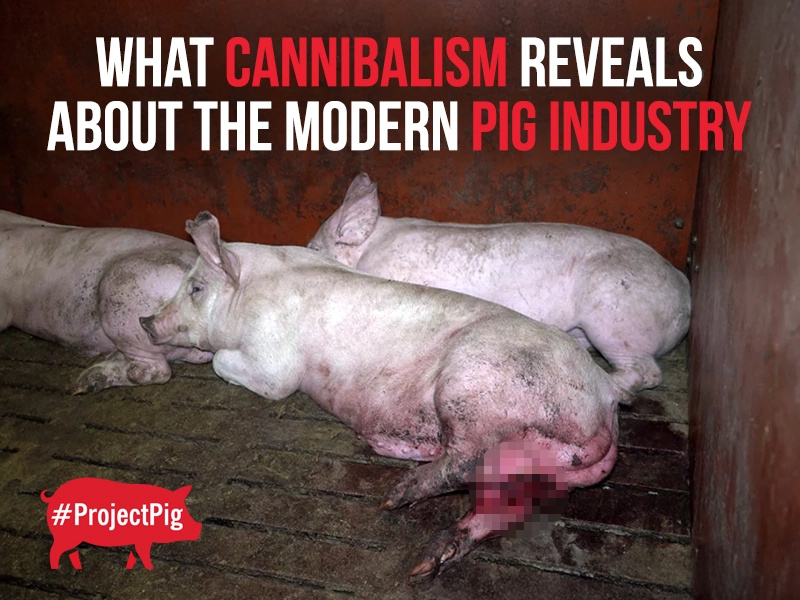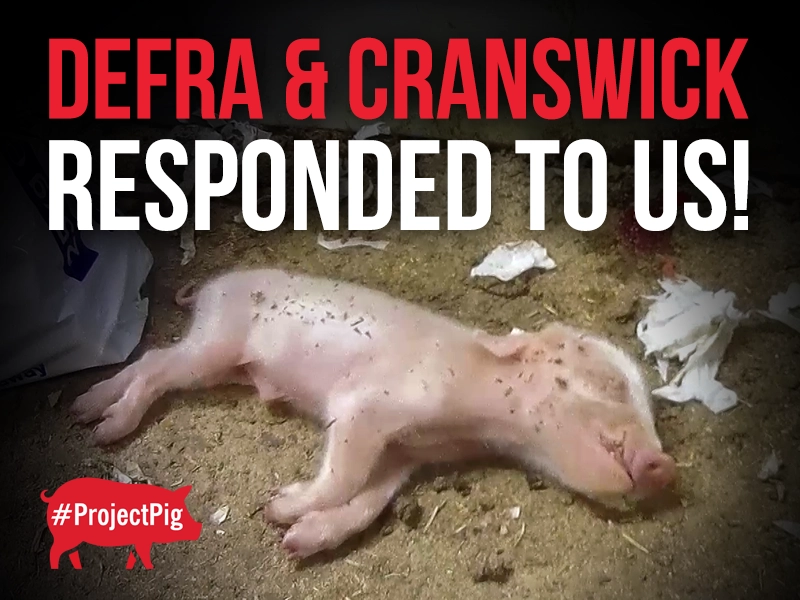
Respect All Life
The RSPCA's hypocrisy

Blog written by Julie Hurst, volunteer blog writer
'For Every Kind'. It's hard to imagine that such a seemingly compassionate and inclusive statement could trigger a fervent five-minute rant on national television. But that's exactly what happened back in April when GB News presenter, Marc Dolan, launched a verbal attack on what is the RSPCA's new brand campaign.
The campaign's launch, which marks the charity's 200th year, is designed to encourage "debate and understanding about the huge challenges facing animals and how we can all play our part", said Chief Executive Chris Sherwood. "We are for every kind of animal" he added, and this is reflected in the advertising accompanying the campaign, which not only features cats, dogs and hedgehogs - animals traditionally associated with the RSPCA's work - but pigs, chickens and cows too. And it's the inclusion of the plight of farmed animals in the messaging which provoked Dolan's ire.

While he acknowledges the crucial role the RSPCA plays in protecting animals, he essentially questions why the same empathy and consideration should be extended to farmed animals. The clear distinction he draws between farmed and non-farmed animals is glaringly incongruous – why love and care for some animals and not others? But it's one that society in general draws too, and is an anomaly that results in the killing of over one billion innocent beings in the UK every year.
Marc Dolan's comments appear to exactly reflect the attitude that the RSPCA's 'For Every Kind' campaign is seeking to counter, but they are in fact quite understandable. Not only do they speak to the near universally accepted 'truth' that he refers to in his broadcast, which is the clear separation in most minds of animals and meat, they also represent a view that has and continues to be fuelled by the actions of the charity itself.
"The RSPCA has lost sight of its original purpose"
The overriding message behind Dolan's opinion piece is that the RSPCA has lost sight of its original purpose. However, the charity was actually founded to oppose all forms of animal cruelty, and farmed animals have simply and sadly fallen from its focus. As Peter Singer explains in Animal Liberation, the once radical organisation became part of the establishment, trying to use its connections to improve the lives of farmed animals. But these connections and their vested interests blunted any criticism, resulting in the charity compromising its fundamental and founding principles for trivial reforms.
As intensive farming practices have increased, the RSPCA has paid little attention, choosing instead to focus its work on companion animals and the nation's free-living animals. Any interest the charity previously had in farmed animals has been lost, and the distinction between farmed and non-farmed animals implied as a result is simply mirrored by the general public's and Dolan's views.

"We're supposed to feel bad for eating chickens"
Given the fairytale we are constantly sold about the lives of farmed animals, it's not surprising that Dolan questions why we should feel bad about eating chickens. But far from frolicking in green pastures and living happy, fulfilled lives, the grim reality is much darker. This is why the industry goes to great lengths to shield the public from its practices and create a chasm between living, breathing beings and the meat on people's plates. For example, and firstly, by means of location. The farms and slaughterhouses are out of sight, and their operations take place behind firmly closed doors. Secondly, by use of language. We are brought up to refer to meat as pork or beef, rather than pig or cow. And thirdly, by processing and packaging. What appears on supermarket shelves bears little, if any, resemblance to an actual animal, and there is a distinct lack of any imagery.
However, the industry is not alone in its efforts to conceal the reality of life for farmed animals. It is aided and abetted by assurance schemes, of which perhaps the most significant player is the RSPCA-backed RSPCA Assured. The welfare claims made by these bodies serve to convince the public that, as Marc Dolan states, they don't need to "feel bad", and although farms that subscribe to these schemes have been called out on multiple occasions and exposed by many undercover investigations, including our own, they continue to avoid further scrutiny.
In the wake of the most recent exposé, which has revealed illegality, cruelty and suffering across a total of 45 RSPCA Assured farms, the charity is still claiming that the vast majority continue to meet certified standards, and is refusing to suspend or scrap the scheme (which contributes an estimated £4m a year to its bottom line). Chris Sherwood is therefore, and unwittingly, absolutely correct when he states that we are all disregarding the suffering of billions, and the RSPCA's failure to take action completely contradicts his campaign call to act urgently to avoid risking animals' lives getting worse, not better.

"They're fed and watered"
Dolan seems perplexed as to why we should be concerned about the chickens featured in the RSPCA advert when they appear to him to be fed and watered. But farmed animals, like many others, are thinking and feeling creatures with not only basic physical needs but emotional and social needs too. Confined within a system driven by profit, these life essentials are completely ignored, and the birds, indeed all farmed animals, suffer hugely as a result.
This capacity for suffering is not only acknowledged by science, with scientists now being forced to reckon with the question "not which animals are sentient, but which animals are not", but is enshrined in UK law. But do we really need science and the law to tell us this? As Marc Beckoff remonstrates in The Emotional Lives of Animals, "Why are we so special? Why are we such deep feeling animals whereas other animals aren't?" and he goes on to write, "While they (animals) can't consent to how they are being treated, they surely protest publicly when they are suffering".
It is a sad fact that we simply choose not to think of farmed animals as the complex beings they are, with rich inner lives, because, in the words of Chris Sherwood, "we've come to see many creatures as commodities, and we value their lives differently because of it".

"The truth is that farmers raise animals and we eat them"
Dolan's 'truth' is the belief system that conditions us to eat certain animals. Described by Melanie Joy in Why We Love Dogs Eat Pigs And Wear Cows as an entrenched ideology, the eating of animal flesh is driven by habit and bias, and reinforced by social conformity. Animals are irrationally classified into edible versus inedible, and we grow up eating those that are deemed 'meat' as passive consumers, irrationally following the status quo rather than as active citizens making empowered choices. As Joy writes, "It is striking how an entire society of rational people can maintain such irrational patterns of thought without catching on to the gaping holes in the logic".
This unthinking attitude continues virtually unchallenged, to the benefit of an industry whose interests it serves, and effectively making a mockery of our supposed love of animals – according to the RSPCA's Kindness Report 69% of Britons call themselves animal lovers. But in terms of farmed animals, our empathy has been replaced by apathy.

If the RSPCA is truly committed to its 'For Every Kind' vision it will actively address this aberration. To quote Chris Sherwood once again, "All animals deserve our kindness and respect and the first step to changing the way we treat animals is changing how we see and feel about them". The RSPCA's own first step must surely be to sever its ties with RSPCA Assured, and return to its 'radical' roots, so that it can confidently campaign to inspire everyone, including Marc Dolan, to treat all animals with the respect, kindness and compassion they so rightfully deserve.
As always,
For the animals.

.png)


.png)













.png)